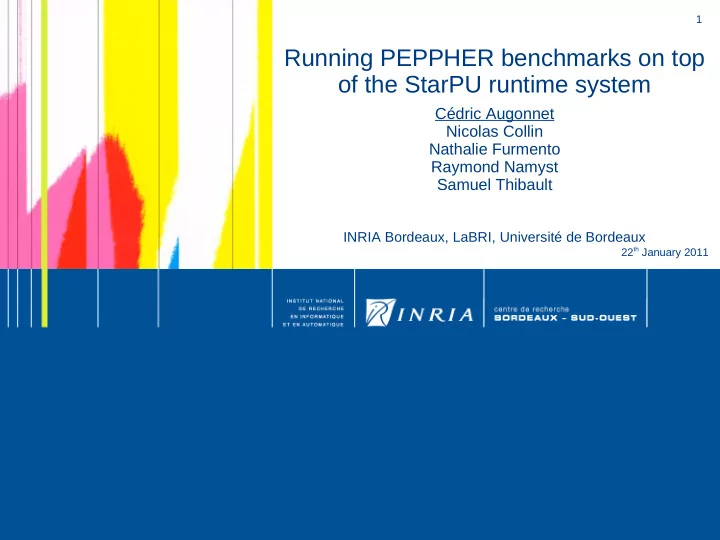

1 Running PEPPHER benchmarks on top of the StarPU runtime system Cédric Augonnet Nicolas Collin Nathalie Furmento Raymond Namyst Samuel Thibault INRIA Bordeaux, LaBRI, Université de Bordeaux 22 th January 2011
2 The StarPU runtime system Motivations • “do dynamically what can’t be done statically” HPC Applications Parallel Parallel Compilers Libraries •Typical duties • Task scheduling • Memory management •Compilers and libraries Runtime system generate (graphs of) parallel tasks Operating System • Additional information is CPU GPU … welcome!
3 The StarPU runtime system Motivations •Main Challenges A = A+B • Dynamically schedule CPU CPU GPU M. tasks on all processing units CPU CPU M. B – See a pool of GPU A heterogeneous cores M. B M. – Scheduling ≠ offloading GPU M. CPU CPU • Avoid unnecessary CPU CPU GPU M. A data transfers between accelerators M. M. – Need to keep track of data copies
4 The StarPU runtime system Memory Management •StarPU provides a Virtual HPC Applications Shared Memory subsystem Parallel Parallel Compilers Libraries • Weak Consistency • Replication • Single writer • High level API • Application registers data StarPU Drivers (CUDA, OpenCL) • Input & ouput of tasks = CPU GPU … reference to registered data
5 The StarPU runtime system Task scheduling •Tasks = HPC Applications • Data input & output Parallel Parallel • Dependencies with other Compilers Libraries tasks • Multiple implementations – e.g. CUDA and/or CPU • Scheduling hints •StarPU provides an Open StarPU Scheduling platform • Scheduling algorithm = Drivers (CUDA, OpenCL) cpu plug-ins f gpu (A RW , B R , C R ) CPU GPU … spu
6 Peppher Benchmarks • Fast Fourier Transform (FFT) • Mixing FFTW and CUFFTW • Dense Linear Algebra • Mixing PLASMA and MAGMA • Computational Fluid Dynamic (CFD) • Porting Rodinia's CFD
7 Dense Linear Algebra Mixing PLASMA and MAGMA (Collaboration with UTK)
8 Mixing PLASMA and MAGMA with StarPU Background • Background • Cholesky/LU/QR: Solve dense linear systems • UTK : ~ leaders for Dense Linear Algebra for 20 years • Need performance portability • State of the art libraries • PLASMA (Multicore CPUs) • MAGMA (Multiple GPUs) • Our approach • Use PLASMA algorithms • PLASMA kernels on CPUs, MAGMA kernels on GPUs • Schedule tasks with StarPU
9 Mixing PLASMA and MAGMA with StarPU Productivity • Programmability • Cholesky: ~half a week, QR: ~2 days of works, LU : ~time to write new kernels • Quick algorithmic prototyping // Sequential Tile Cholesky // Hybrid Tile Cholesky FOR k = 0..TILES-1 FOR k = 0..TILES-1 DPOTRF(A[k][k]) starpu_Insert_Task (DPOTRF, …) FOR m = k+1..TILES-1 FOR m = k+1..TILES-1 DTRSM(A[k][k], A[m][k]) starpu_Insert_Task( DTRSM, …) FOR n = k+1..TILES-1 FOR n = k+1..TILES-1 DSYRK(A[n][k], A[n][n]) starpu_Insert_Task( DSYRK, …) FOR m = n+1..TILES-1 FOR m = n+1..TILES-1 DGEMM(A[m][k], A[n][k], A[m][n]) starpu_Insert_Task( DGEMM, …)
10 Mixing PLASMA and MAGMA with StarPU • Cholesky decomposition • Hannibal: 8 CPU cores (Nehalem) + 3 GPUs (NV FX5800)
11 Mixing PLASMA and MAGMA with StarPU • QR decomposition • Mordor8 (UTK) : 16 CPUs (AMD) + 4 GPUs (C1060)
12 Mixing PLASMA and MAGMA with StarPU • QR decomposition • Mordor8 (UTK) : 16 CPUs (AMD) + 4 GPUs (C1060) MAGMA
13 Mixing PLASMA and MAGMA with StarPU • QR decomposition • Mordor8 (UTK) : 16 CPUs (AMD) + 4 GPUs (C1060) +12 CPUs ~200GFlops Peak : 12 cores ~150 GFlops
14 Mixing PLASMA and MAGMA with StarPU • Memory transfers during Cholesky decomposition ~2.5x less transfers
15 Mixing PLASMA and MAGMA with StarPU Perspective • Add more algorithms • 2-sided Factorizations (eg. Hessenberg) • Solvers • Going to be released as a standalone library • Toward a complete LAPACK implementation for hybrid computing • Need autotuning facilities! • Next step: integrate MPI • On-going work • Accelerated SCALAPACK ?
16 Rodinia's CFD Solver
17 Rodinia's CFD Solver Background • The Rodinia benchmark suite • Cover the different « Berkeley Dwarves » • Available either in OpenMP or in CUDA • Neither multi-GPU nor hybrid systems • Rodinia's CFD Solver benchmark • 3D Euler equations for incompressible flow • Unstructured Grid Finite Volumes • Memory intensive kernel • Pre-processing and Post-processing are not available – Need to create our own input meshes
18 Rodinia's CFD Solver Methodology • Pre-processing • Generated a mesh of the air around a sphere • Very simple yet ! • Parallelizing the problem • Partition the mesh using SCOTCH • 1 task = update 1 part • Redundant computation • Exchange part boundaries
19 Rodinia's CFD Solver Post-processing
20 Rodinia's CFD Solver Preliminary results • Problem size • 64x64x64 grid, 1.3 Millions tetrahedrons • Reference CPU performance • 1 core (Intel Westmere X5650) – 1.4s per iteration • 12 cores – 0.15s per iteration • Preliminary performance with StarPU • 1 NVIDIA C2050 – 53ms per iteration • 2 NVIDIA C2050 – 28ms per iteration • We need large problems !
21 Rodinia's CFD Solver Perspective • Port in OpenCL • Use hybrid platforms • GPUs are much faster than CPUs – Memory bound – Rather few tasks • Parallel CPU tasks – large granularity • Heterogeneity-aware data layout • CPUs : Arrays of Structures (cache friendly) • GPUs : Structures of Arrays (SIMD friendly)
22 Conclusion • StarPU • Data management & Task scheduling • Freely available under LGPL on Linux, Mac and Windows • Adapted 3 PEPPHER benchmarks • FFTW + CUFFTW • MAGMA + PLASMA • Rodinia's CFD Solver
23 Conclusion • Productive approach • Rely on existing kernels for CPU/GPU • Architecture independent task model • Higher-level front-ends would help – StarSs, HMPP, Codeplay's Offload • Autotuning will be required • Need to find optimal granularity – Parallel tasks – Divisible tasks • Select code variants – eg. with SkePU
Recommend
More recommend